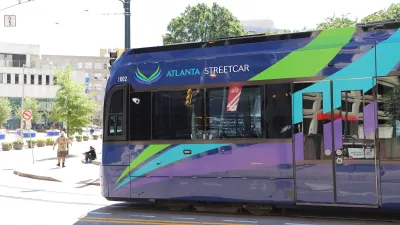In this op-ed, Michael Andregg touts Personal Rapid Transit over 'financially unsustainable' light rail, which he blames politicians for encouraging.
"The old technology was light rail and the new technology Personal Rapid Transit, or PRT. Engineers at the U showed that PRT could do a superior job for about a third of the cost in energy and money compared to buses and trains, including "light" trains. It could do this because it involves very light electric vehicles carrying only one to three passengers on nonstop, one-way trips above existing transportation grids on 3-foot diameter guideways. They showed that PRT could operate 24 hours a day over entire areas rather than be confined to schedules on high-density corridors because it requires no drivers and that it could be built without tearing up neighborhoods or businesses for years. Per mile, it would cost about one-tenth as much to build as light rail.
These are not 'hard numbers' but careful estimates, because vested interests quickly got a provision written into law forbidding consideration of any technology not fully proven. Engineers and the U wanted to prove it.
But that requires permission from politicians, and 'light' rail was busy spending millions to prepare the political ground for their old streetcar technology. Some among them recognized the peril the new PRT represented to their selfish interests. They could not hold our region hostage to a system that requires vast annual subsidies to operate if the U's invention became well known. So they did all they could to strangle it in the crib."
FULL STORY: Fascination with trains costs Minnesota plenty

Alabama: Trump Terminates Settlements for Black Communities Harmed By Raw Sewage
Trump deemed the landmark civil rights agreement “illegal DEI and environmental justice policy.”

Study: Maui’s Plan to Convert Vacation Rentals to Long-Term Housing Could Cause Nearly $1 Billion Economic Loss
The plan would reduce visitor accommodation by 25% resulting in 1,900 jobs lost.

Planetizen Federal Action Tracker
A weekly monitor of how Trump’s orders and actions are impacting planners and planning in America.

Waymo Gets Permission to Map SF’s Market Street
If allowed to operate on the traffic-restricted street, Waymo’s autonomous taxis would have a leg up over ride-hailing competitors — and counter the city’s efforts to grow bike and pedestrian on the thoroughfare.

Parklet Symposium Highlights the Success of Shared Spaces
Parklets got a boost during the Covid-19 pandemic, when the concept was translated to outdoor dining programs that offered restaurants a lifeline during the shutdown.

Federal Homelessness Agency Places Entire Staff on Leave
The U.S. Interagency Council on Homelessness is the only federal agency dedicated to preventing and ending homelessness.
Urban Design for Planners 1: Software Tools
This six-course series explores essential urban design concepts using open source software and equips planners with the tools they need to participate fully in the urban design process.
Planning for Universal Design
Learn the tools for implementing Universal Design in planning regulations.
Caltrans
Smith Gee Studio
Institute for Housing and Urban Development Studies (IHS)
City of Grandview
Harvard GSD Executive Education
Toledo-Lucas County Plan Commissions
Salt Lake City
NYU Wagner Graduate School of Public Service




























